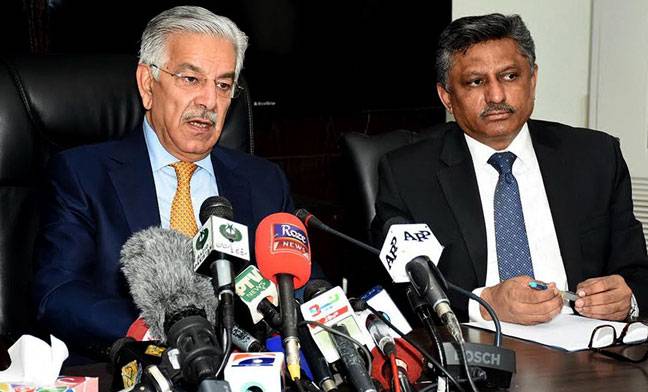ISLAMABAD - Pakistan and India have agreed to hold secretary-level talks over the controversial hydropower projects in Washington next month.
The major breakthrough in otherwise frosty relations between two arch-rivals came after the United States intervention that forced the neighbouring countries to resume talks for resolving two controversial hydropower projects including 300-megawatt Kishanganga and under construction 850-MW Ratle hydroelectric projects in Occupied Jammu and Kashmir, Federal Minister for Power and Khawaja Asif told the newsmen here Monday.
“The United States has intervened and decided to help both the countries in resolving the issue. There will be secretary-level talks on the Ratle and Kishanganga hydropower projects between both the countries in Washington on April 11-13, 2017.”
Kh Asif said Pakistan was seeking International Court of Arbitration (ICA) through the World Bank while India insisted resolving the issue through neutral experts.
“Under the Indus Water Treaty (IWT), New Delhi has to share all the details of any hydropower project on the rivers on which Pakistan has water rights under the treaty. However no design of these projects has been shared with Pakistan, which is a violation of the treaty,” he added.
Pakistan has serious reservation on the designs of these controversial projects and believes that these projects would concede India to impede the water flow to Pakistan.
The water and power minister also lauded India’s decision of taking part in the current Indus water commission talks on IWT, and hoped the meeting would help resolving the standing issues between the two neighbouring countries.
During the process, he said Pakistan had always been struggling to keep the talks process continue in the light of the Treaty, but the other side was not inclined to keep the ball rolling for the peaceful settlement of the issues.
“It is a happy augury that of late India has come back to the dialogue table at the Commission level to re-launch the process of peaceful talks. We welcome this decision of India, which has dispatched the Commission to Pakistan for holding two-day parleys.”
Pakistan, he said, had always been pleading that the Indus Basin Waters Treaty was one of the few world level treaties that provided forum to get resolution of water issues in a peaceful manner. “Implementation and safeguard of this treaty is in the best bilateral interest,” he added.
The experts from both the countries have opened the round-table talks here over water dispute with Indian side being led by India’s Indus Water Commissioner PK Saxena while Pakistan’s Indus Water Commissioner Mirza Asif Baig is leading the Pakistani side.
Kh Asif said current Indus Water Commission dialogues would focus on three power projects on River Chenab in Held Kashmir with varying capacities of power generation including Pakul Dal (1,000MW), Miyar (120MW) and Lower Kalnai (48MW).
Responding to a question, the minister said the Neelum Jhelum power project would be completed in March, 2018. To another question, he said lower canal and Ratle projects were at initial stages while no progress had been made on the Wullar Barrage so far. He told a questioner that no speculations could be made about the outcome of the talks.
Meanwhile, in the meeting, Pakistan has demanded of the Indian commission for allowing visit to the sites of three controversial hydropower projects located in Occupied Kashmir.
The Indian side while declining Pakistan demand for the visit to the site said the condition in the hydroelectric project area is not conducive for the visit of Pakistani delegation, official sources told The Nation.
On the first day of the dialogues Pakistan side raised objection to three hydropower projects and demanded to visit Pakal Dul project, Miyar and Lower Kalnai hydropower project sites in Indian Held Kashmir, the source said. The Indian delegation has assured to consider Pakistan’s concern on these hydropower projects, the source said.
Pakistani delegates also demanded of the Indian commission, the flood data. The Indian side agreed to share the same with Pakistan, the source said. The second round of talk of the Permanent Indus Commission (PIC) will be held here today (Tuesday).
The two-day Indus Water Commission meeting took place after a gap of almost two years, with the last round held in May 2015.
The long pause occurred after Pakistan’s Indus Waters Commissioner had announced the failure of the talks after protracted discussions at commission level in 111th meeting of PIC in Jan-Feb 2015 on the design aspects of Kishanganga and Ratle hydroelectric plants that India is constructing on Kishanganga/ Neelum River (a tributary of Jhelum River) and Chenab River, respectively.
In July 2016, a high-level delegation headed by secretary Water and Power visited New Delhi to discuss on these projects. But inflexible attitude of India in settling the issue with mutual consensus and a failure in reaching any conclusion, Pakistan decided to go to Permanent Court of Arbitration (PCA) against India in a last-ditch effort to decide the issue with a consensus.
In September last, Pakistan approached the World Bank amid Indian threat of revoking the 56-year-old treaty and requested to apply Arbitration Article IX of the IWT that deals with arbitration of disputes between both the countries concerning the interpretation or application of the treaty. Under the treaty, the World Bank has an important role in establishment of the Court of Arbitration.
The World Bank had earlier declared the formation of the court and appointment of neutral expert, but ironically it announced a “pause” in both the separate processes initiated by Pakistan and India to allow the two countries to consider alternative ways to resolve their disagreements.






